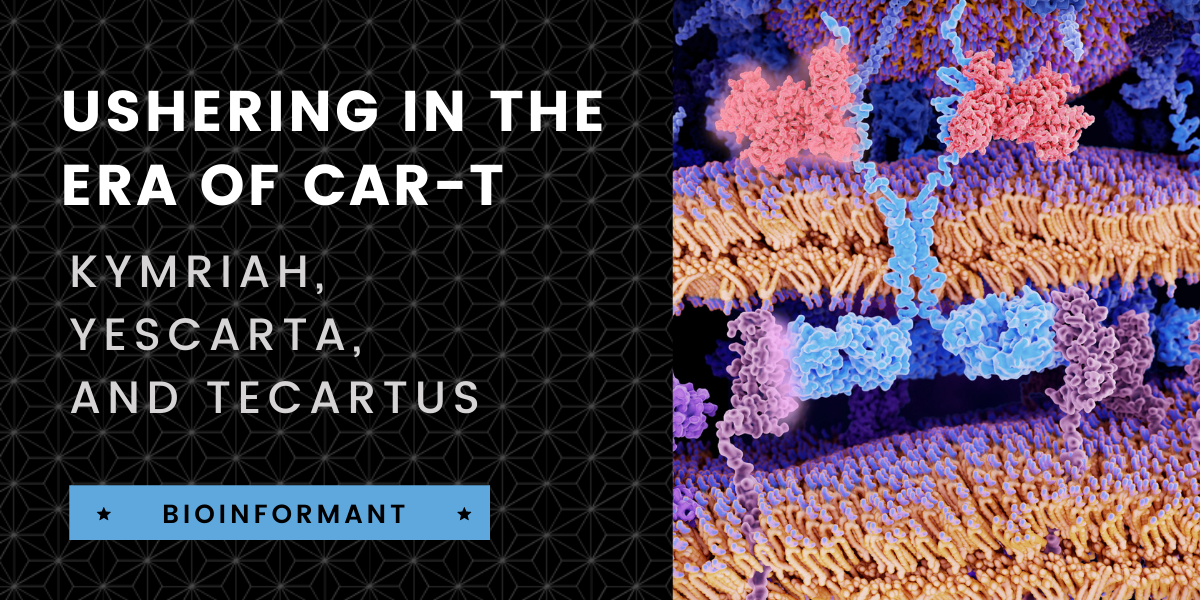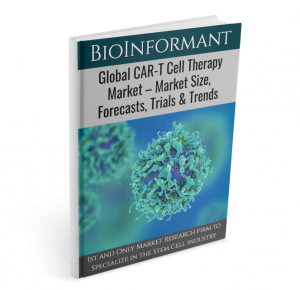CAR-T cell therapy is a remarkably promising treatment for cancer patients. It is a type of immunotherapy where doctors collect immune cells, modify them in a laboratory, and provide them the power to easily recognize and kill cancer cells. When infused into a patient, the cells get multiplied and stay in the body as “living drugs.”
T-cells form the backbone of CAR-T cell therapy. T-cells are the workhorses of our immune system and play a key role in directing the immune response and killing cells infected by pathogens. In CAR-T cell therapy, blood is drawn from the patient and the T-cells are separated out. In the laboratory, a disarmed virus is then used to genetically engineer the T-cells to produce chimeric antigen receptors (CARs) on their surface. These receptors are synthetic and do not exist naturally. Once infused into the patient, these CARs enable the T-cells to recognize and get attached to an antigen (specific protein) on the tumor cell leading to the destruction of the tumor.
Since the approval of the first CAR-T cell therapeutic in 2017, widespread research, an exponential increase in clinical trial activity, proliferative M&A activity, and lucrative IPOs have created a robust CAR-T cell market. This billion dollar market would not have been possible without the remarkable efficacy of Kymriah, Yescarta and Tecartus in treating several types of blood cancers.
CAR-T Cell Therapy Market
In 2012, there were only 12 clinical trials investing CAR-T cell therapy products. Today, that number has risen to 514. Between 2017 and 2020, three CAR-T products reached the market, and this number is projected to reach double digits by 2024.
The earliest approvals, Kymriah and Yescarta, have been commercially available since 2017 and 2018, respectively. They’ve been infused into nearly a half million patients worldwide. In July 2020, the U.S. FDA approved a third CAR-T cell therapy, Kite Pharma’s brexucabtagene autoleucel (sold as Tecartus).
All the three of the approved CAR-T products and nearly 75% of the ongoing clinical trials take an autologous treatment approach. Autologous (self-derived) CAR-T cells are expensive to produce because they are manufactured on a patient-by-patient basis. At times, autologous production can be hampered by a shortage of CAR-T cells or viral vectors. The cost of autologous CAR-T therapy is further escalated by the need for a complex cold chain during transportation. Another key issue is the “vein-to-vein” time or the time that elapses between apheresis and product delivery.
Thus, CAR-T therapies are most often recommended for the end-stage patients who have exhausted all the other treatment options. These challenges drive up the price, making CAR-T therapy unaffordable for a large percentage of patients.
To support the adoption of CAR-T cell therapies, the industry is taking measures to mitigate these challenges. Several CAR-T players have started using efficient gene-transfer tools to impregnate the T cells with CARs. There are numerous examples of partnerships to develop CRISPR and electroporation technologies to modify the T cells. Some companies are also using “on-off” switches that can turn off CAR-T cells to prevent toxicity.
Unfortunately, the goal of achieving CAR-T success against solid tumors remains elusive thus far, with clinical trials demonstrating a severely limited response.
Trends in CAR-T Cell Therapy
CAR-T cell therapy has taken the biotech industry by storm, creating hope that it could usher in a new era of cancer treatment. However, the success stories have come from targeting CD19, which is now considered an antigen that holds the key to a limited range of blood cancers. Presently, this hematological arena is a highly competitive and is being targeted by numerous CAR-T cell therapy competitors.
Scientists, investors and developers invariably agree that the key to longer-term success in this sector depends on solving two major problems: identifying antigens other than CD19 that can be targeted with CAR-T therapy with strong efficacy and going beyond liquid cancers into solid tumor indications. CAR-T cell products targeted against solid tumors will undoubtedly offer a larger market potential.
However, it is not an easy task to identify the antigens found on the cells of solid tumors. There are reasons why CD19 is the most common target. It is seen solely on B cells, whose destruction via CAR-T therapy offers a straightforward route for treating B-cell leukemias and lymphomas. At the same time, loss of the body’s B cells is not particularly problematic, because their antibody-producing function can be reinstated by injecting intravenous immunoglobulin (IVIG) to patients.
Driving Forces Impacting the CAR-T Cell Therapy Market
2017 was the first year that the U.S. FDA approved a CAR-T cell therapy, approving Kymriah in August 2017 and Yescarta in October 2017. Novartis produced Kymriah, a CAR-T therapy used to treat leukemia, while Gilead/Kite Pharma produced Yescarta, a CAR-T therapy to designed for patients with lymphoma. Approvals for these products spread like wildfire, with the EU, Canada, Australia, Japan, and other nations following suit.
In July 2020, the U.S. FDA approved the third CAR-T cell therapy, approving Kite Pharma’s brexucabtagene autoleucel, sold as Tecartus. It is the first CAR-T therapeutic to treat relapsed or refractory mantle cell lymphoma (MCL). The approval of these early CAR-T cell therapies has opened the gates for many other types of cell and gene therapies to claim respect, from regulators, as well as the scientific and medical community at large.
Today, the CAR-T cell therapy industry is witnessing:
- Landmark approvals of CAR-T cell therapies by regulatory bodies worldwide
- Lucrative acquisitions within the CAR-T industry
- Large IPOs within the industry
- An increasingly competitive IP environment
- Unprecedented investment flowing into CAR-T cell research
CAR-T cell therapy has proven itself to be a promising new treatment approach. As its manufacture, administration, and safety profile improve, we will witness the rise of CAR-T cell therapeutics.
For this reason, BioInformant has released a December 2020 global report that reveals:
- Market size determinations with segmentation and forecasts through 2027
- Approved CAR-T products by indication and region
- Clinical trial activity by type, region, phase, and sponsor
- CAR-T industry M&A transactions and IPOs
- Strategic partnerships and commercialization agreements
- Industry trends and future directions
- Competitors composing the global marketplace
- And much more
In compiling this report, BioInformant’s analysts leveraged eight years of historical data on the CAR-T market (2012 to present). In addition to conducting extensive secondary research, our analysts interviewed dozens of highly regarded CAR-T industry leaders, including but not limited to those featured here. With the competitive nature of this global market, you don’t have the time to do the research. Claim this report to become immediately informed, without sacrificing hours of unnecessary research or missing critical opportunities.





















Tell Us What You Think!